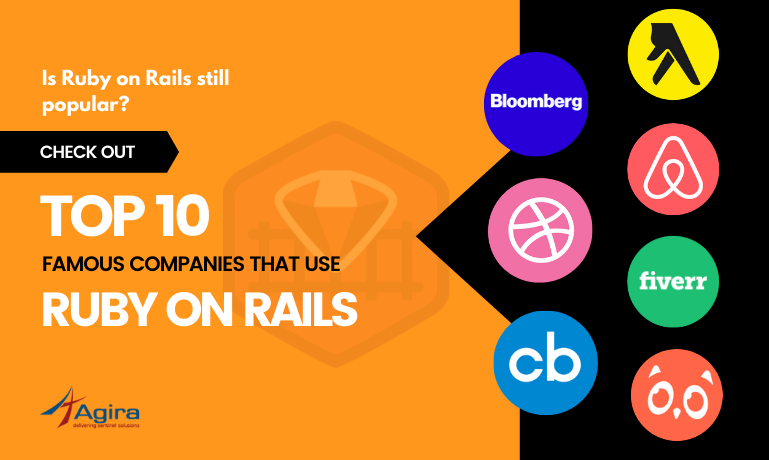Ruby on Rails is one of the major development platforms that let the developers build web applications effortlessly in very less time. One cannot question its reliability, efficiency and scalability if they know about Ruby on Rails development. Many major organizations and business are relied on this development framework to build their applications and to harness all the benefits of the Ruby on Rails development.
Despite the benefits of Ruby on Rails development, and due to the growing popularity of Python, many people have a misconception that Ruby is getting out of trend. It is important to understand that Python is getting more traction because of its use in Artificial intelligence, machine learning and data science applications. So, Ruby on Rails is a reliable platform for building robust web applications. So to clear out the clouds, here is the list of frequently asked questions about Ruby on Rails development.
Before continuing with the Ruby on Rails FAQs, it is important to understand what is Ruby on Rails.
What is Ruby on Rails?
Ruby on Rails is an open-source web development framework with varied toolsets and an actively strong community of developers. It is well-known for its speedy development and ease of coding. This is why it is popular among developers as well as entrepreneurs. It is flexible to any new changes in the technical environment without showing any delay. It stays ahead of the competition with its minimal steps of the web development cycle. Despite the industry, you can choose Ruby on Rails to develop your web application.
If you own a business or planning to build a web application for your business, here are a few Ruby on Rails FAQs that are asked by entrepreneurs and developers.
Ruby on Rails FAQs
1. What are the benefits of choosing Ruby on Rails for building a web application?
It is pretty hard to find a programing language rich in tools for web development. It provides integrated support for the entire life cycle of web applications. Some of the notable benefits of choosing Ruby on Rails are the following.
- Gem of libraries to leverage the core value of Ruby on Rails and provides rich resources for developers to implement any features in the web application.
- Well-structured and user-friendly code to overcome the complexities in deployment or updates.
- Scalability is what every business will thrive when they think of mining the best frameworks for web development.
- Ruby on Rails is the match made for Web Development.
- Another benefit of Ruby on Rails is, it encourages the greater security and workflow for creating excellent products.
- ROR also has some excellent testing features which collaboratively follows the TDD and BDD approaches.
- It provides both front end and back end solutions and comes with built-in solutions.
ALSO READ: 8 Benefits of Using Ruby On Rails For Web Development
2. What are the best use cases for Ruby on Rails?
Some of the major use cases of Ruby on Rails should include web applications development, e-commerce development, repositories, media streaming applications and software as a service application. Take a look at the top companies that involves Ruby on Rails in their development process below.
3. What are the major companies that use Ruby on Rails?
Some of the top companies that use Ruby on Rails are the following.
- Ecommerce sites – Shopify
- Video streaming applications – Hulu, twitch
- Online Marketplace – Airbnb
- Project Management tools – Basecamp
- Social media platforms – Goodreads, Ask.fm, Twitter
- Cloud Applications – Zendesk
- Development platforms – Github, Heroku
5. What are the drawbacks of RoR?
The ruby on rails development is largely dependent on the knowledge and expertise of the ruby on rails development when it comes to web development. It is also important to choose the right steps to configure technology. Your applications might not work effectively if the developer chooses the convention-over-configuration paradigm or incapable of finding project-specific solutions. Ruby on Rails may not be too good if you are expecting high demand or high traffic web applications.
6. When not to use Rails?
You can develop any web application using Ruby on Rails because it is a web development framework. You should be technically sound to choose the perfect framework for your business. So, if you are a business executive with less knowledge of technology, we are here. Here are a few cases that would not be the best when it is developed using Ruby on Rails.
- You can choose a cost-effective solution if you want to develop a simple and static web application.
- It is not recommended to develop a blogging application or site using Ruby on Rails. You can opt for WordPress instead.
- High demand or traffic applications like social media may not perform better with Ruby on Rails.
Ruby on Rails is much popular for its high-end technology applications that are effective and quick to develop. If you wanna build a minimum viable product for your business, it is the perfect choice to opt-for. You can also believe in Ruby on Rails to solve complex business problems.
ALSO READ: Why Ruby on Rails is Perfect for E-Commerce Development
7. Does Ruby on Rails Still has demand in the industry?
The demand for Ruby on Rails in the industry is still high and never goes down. In many cities, Ruby on Rails developers are on-demand as you can see the job postings available in the sites like Indeed.com. This answers one of the major questions of why they should learn Ruby on Rails in 2020.
Frequently asked questions about Ruby on Rails in StackOverflow.
- What is the difference between <%, <%=, <%# and -%> in ERB in Rails?
- How to use concerns in Rails 4
- Is Ruby pass by reference or by value?
- How is attr_accessible used in Rails 4?
- Auto-loading lib files in Rails 4
Got More Questions?
Get your questions answered in minutes by commenting on the section below. We have a team of Ruby on Rails expert to clear your doubts and provide instant solutions for your business problems.
Get in touch with the best web development company now by hiring the best Ruby on Rails developers in the industry for your business.











